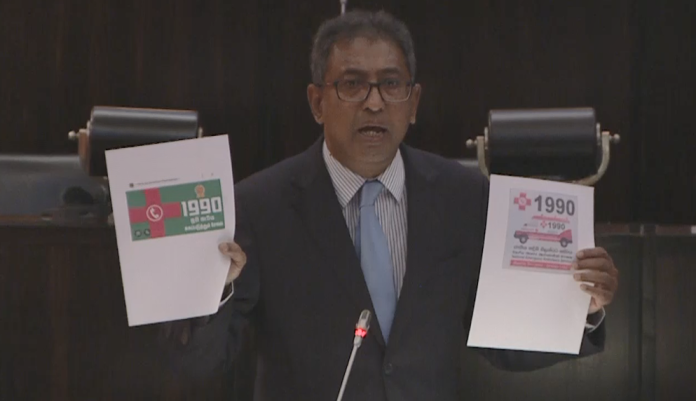Samagi Jana Balawegaya (SJB) MP Dr Harsha de Silva launched a sharp criticism in Parliament today (9), condemning alleged government directives to alter the identity and branding of the popular ‘1990 Suwa Seriya’ ambulance service.
Expressing deep disappointment, Dr de Silva claimed that attempts were underway to remove the well-recognised name, logo, and colours of the emergency service, which he described as one of the most trusted and loved public services in Sri Lanka.
Recalling the origins of the initiative, the MP noted that the Suwa Seriya Act (Act No. 18 of 2018) — which he introduced in Parliament on 21 June 2018 — clearly defines the objective of the foundation under Section 19: to provide “free pre-hospital care, ambulance services, and emergency treatment services” to any person in need across the country.
“Today, everyone in this country calls Suwa Seriya when they are in trouble,” Dr de Silva said, adding that it is a service the people “love the most” and trust deeply.
Highlighting the service’s impact, he stated that Suwa Seriya operates 24 hours a day, covers 28,000 kilometres daily, and transports around 1,050 patients to hospitals every day. To date, the service has provided emergency assistance to over 2.5 million people nationwide.
However, Dr de Silva expressed alarm at what he called politically motivated efforts to alter the service’s identity. “I am sorry to say, a directive has been given to that group to change this,” he said, alleging that instructions had been issued to:
- Remove the name “Suwa Seriya”
- Delete the name from Section 19 of the Act
- Change the official colours to “add your [NPP] colours”
Questioning the purpose behind these actions, he asked, “What is this? Why are you doing this?” and urged the government not to tamper with a service that has saved countless lives.
“Please do not destroy this,” he pleaded. “If you are changing these things, bring an amendment to Parliament.”
Dr de Silva stressed that any change to the name, logo, or colours of the Suwa Seriya Foundation must be done transparently and lawfully through proper parliamentary procedure — not through arbitrary administrative directives.




